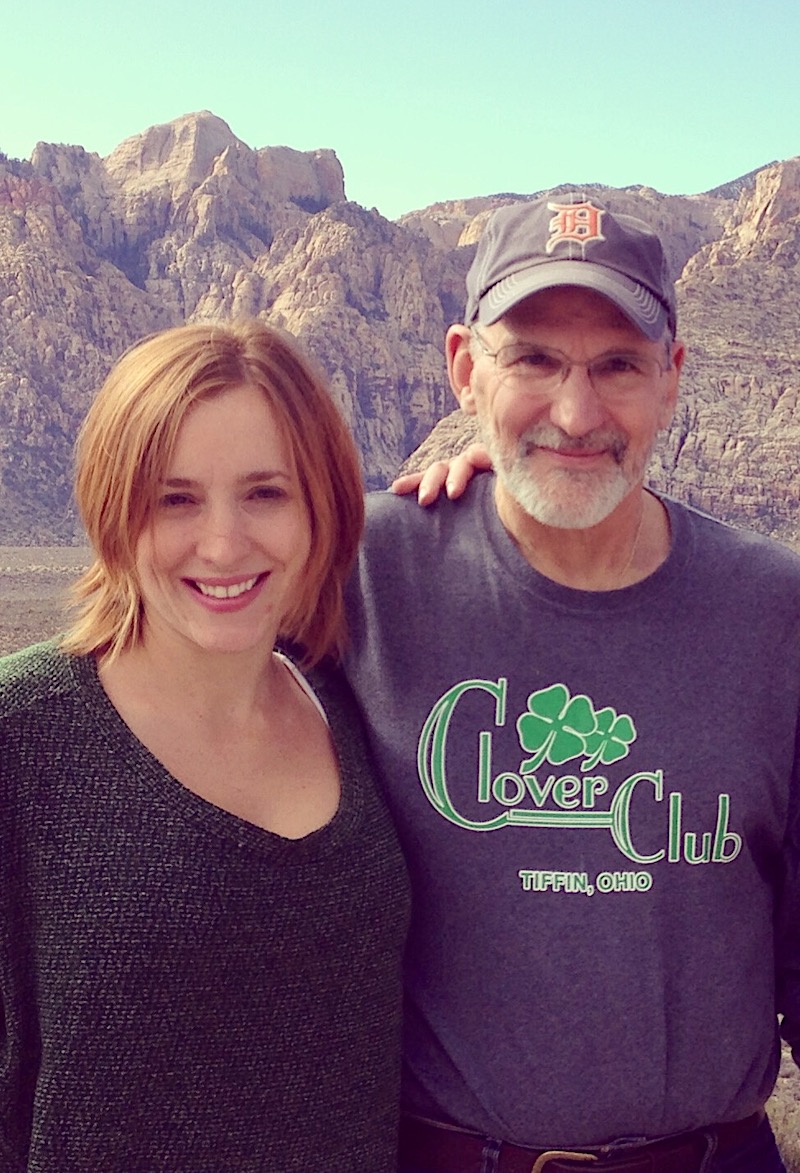The mental health Rubik’s Cube: Finding the right balance
May 22, 2019
May is designated as Mental Health Awareness Month, and as USC Chan occupational therapy student Katherine Crutsinger looks forward to her clinical career ahead, she reflects on her father’s and her own lived experiences with mental health.
By Katherine Crutsinger MA ’19
As a child and adult, I was really disappointed by my dad’s limitations, but I was not able to connect them with his mental health. Instead, I was angry at a father who did not provide the love and support that I had seen in other friends’ fathers.
For much of my teenage years and in my 20s, I distanced myself from my dad, feeling the need to protect myself emotionally rather than connecting with him. As a family member, it’s hard to find a good balance between compassion and boundaries for one’s own mental health. Looking back, I wish I had acknowledged more of his strengths, had more compassion for his limitations and connected more often in ways that did work in our relationship.
Three years ago, my dad died by suicide. As a [relative, friend, coworker, fill-in-the-blank], it’s really easy to look at another person and label them as weird, selfish, dramatic, difficult, hopeless, crazy, frustrating, etc. It’s easy to lose compassion or not even realize they are struggling with mental health issues. The United States is a country where a person is supposed to “pull oneself up by one’s bootstraps.” In reality, we all need a community of support for our mental health, especially if mental illness is involved. This can include friends and family but also mental health professionals like counselors, psychiatrists, social workers and even occupational therapists.
As I have gone through the USC Chan master’s program, I reflected on my dad’s suicide through a clinician’s eyes. When I think of the last decade of my father’s life, I see a man who cut off a lot of friendships and significantly limited his social support. In the last year of his life, as he aged into his 60s, he gave up running due to knee pain. He began running during his teenage years, and it was probably his most powerful coping strategy.

Kate and her father, who died by suicide. She reflects on his life and death through the lens of her occupational therapy training. Photo courtesy of Katherine Crutsinger.
In addition to losing his favorite leisure occupation, he retired from work that same year due to other health complications. Losing both of his leisure and productive occupations, my father was finding himself without an identity. More and more, I see meaningful occupations as paramount to living, and I connect the loss of occupations with my dad’s mental illness and his death by suicide, as a contributing factor to his depression as well as a symptom of his mental illness.
I struggle with my own mental health. I have since my first episode of mental illness at 14, and it remains an aspect of my life, part of who I am. In the past few years, I’ve come to accept it without judging it as a deficit or as an ugly, shameful part of myself to be hidden away.
Instead, my experience of mental illness has made me stronger and has fundamentally impacted my values and understanding of this world. It took much of my 20s to stabilize and find what works for me. It can often feel like a Rubik’s Cube; finding the right balance. The foundation of healing began by surrounding myself with supportive friends and family and working with experienced mental health professionals. I’ve found medication, as well as cognitive behavioral therapy, talk therapy and other healthy coping strategies, to be effective for me to engage in my daily routines.
I still have relapses, even during my time here at USC. I’ve found it helpful to explain mental health like this: Visualize mental health as a bandwidth for coping with stressors. There are a TON of stressors in grad school, from exams to fieldwork to finances. Mental illness narrows that bandwidth. If a relapse occurs, it is because I need more bandwidth to move through the stressors. I can get that through coping strategies like therapy, making time with friends, exercising, etc. Of course, in the moment it does not seem so simple, and I have been practicing for twenty years. Becoming motivated to initiate coping strategies is a big hurdle. A lot of times my first step is reaching out to someone for some help in doing that.
After two years, I’m almost done with grad school! I just have my last fieldwork to complete. Through this program I’ve started on a new path as a mental health clinician. I love working in mental health and supporting others in finding their balance. My lived experience as both a daughter of someone with mental illness as well as an individual with mental illness is an integral part of who I am as a clinician.

Katherine Crustinger graduated with her Master of Arts in Occupational Therapy degree from the USC Chan Division of Occupational Science and Occupational Therapy on May 10, 2019. Photo courtesy of Katherine Crutsinger.
If you are struggling with your mood, anxiety, suicidal thoughts, thoughts of hurting others, hearing voices that others can’t, seeing things that others can’t, struggling in coping with daily life or any other mental health issues, seeking support is imperative for recovery. As a [relative, friend, coworker, fill-in-the-blank], if you see someone struggling, reach out. Ask them how they are doing, really listen and empathize. Take a step towards destigmatizing mental illness. Talk to them about seeking help. A helpful website to find support is samhsa.gov/find-treatment.
⋯
Next by tag Health and Wellness ⟩ Students ⟩





